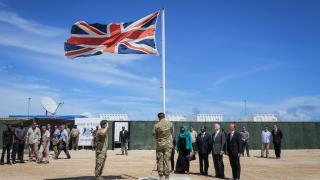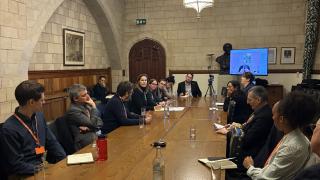
Earlier this year the UK Government committed to holding the largest review of the UK’s foreign, defence, security and development policy since the end of the Cold War. The Integrated Review was intended to go beyond the parameters of a traditional review by considering the totality of global opportunities and challenges the UK faces.
The Review was expected to be published in mid-November but its future is now unclear following the Government’s cancellation of the Comprehensive Spending Review upon which it was to rest. The Government now has to decide whether to go ahead with a top-level Review which makes no new spending commitments, or to postpone or cancel the Review.
A lack of clarity
The status of the Integrated Review is currently disputed. The Chair of the House of Commons Defence Committee tweeted that the Prime Minister had personally assured him that the Review would go ahead, but the chair of the Foreign Affairs Committee told Parliament that he understood that the Review had been put on hold. This all contributes to the perception that UK foreign policy is “adrift” in the words of a new report from the Foreign Affairs Committee. That same term was used in a report from LSE IDEAS in 2015, which in turn inspired UNA-UK’s Keeping Britain Global campaign. The concern therefore is that there has been an absence of direction for some time.
As we have previously reported, UNA-UK was deeply disappointed by the limited and hasty nature of consultation from which this Review has drawn, and by the fact that the absence of proactive outreach meant that the Review is likely to have only heard from certain well connected sections of the public and civil society. The absence of clarity over if, and with who, the government consulted before pre-empting their inquiry with the decision to merge its Foreign and Development departments increases the cause for concern.
Recommendations for a more strategic approach to foreign policy
UNA-UK attempted to compensate for these shortcomings with our own outreach campaign. In 2015 the submissions we generated in this manner ended up representing 15% of the total number of submissions received. As there was even less publicity around the consultation process in 2020 our supporters may well, once again, have had an outsized effect.
UNA-UK’s own contributions took the form of:
- A formal response to the government’s inquiry
- A second response on behalf of the UK Campaign to stop killer robots on lethal autonomous weapons systems specifically
- A response to the house of commons Foreign Affairs Committee’s Inquiry on the Government’s inquiry
- A second response, co-written with our colleagues at Protection Approaches, concentrating on the need for an Atrocity Prevention strategy (these two responses were cited a total of five times in the final report, with the result that it contained strong sections on the need to “defend the rules-based international system and its multinational organisations… convene and catalyse negotiations to reform multinational organisations [and] prioritise… mediation, conflict resolution, and atrocity prevention”
- Support to Rethinking Security and the Atrocity Prevention working group on their joint submissions to the Review and Foreign Affairs Committee’s inquiry
- A response to an earlier inquiry from the Defence Committee
- An earlier statement and letter to the Prime Minister outlining our hopes and expectations for the Review
Each of these publications has stressed the following points:
- The UK must adopt a holistic attitude to security, encompassing more than defence, and rooted in the people of the United Kingdom. To this end it must commit to collaborative and participatory mechanisms for engagement in the implementation of this strategy and consultation on future strategies. An explicitly feminist foreign policy would have this effect, and other benefits besides
- The UK must recommit to universalist multilateralism and the idea of a rules-based global system. To this end it must ensure consistency in its domestic and international policies, and refrain from violating international laws or internationally agreed human rights standards whether via legislation, arms export policies or other actions. Embedding accountability mechanisms, including parliamentary and public oversight will help guard against the risk of public commitments being undermined by subsequent actions
- The UK must show leadership on the global stage when it comes to shaping the future trajectory of security policy, through initiatives such as:
- Planning for nuclear disarmament by developing a strategy for post-nuclear security (the urgency of this task is increased now that nuclear weapons have been declared illegal) and adopting an assumption of non-renewal of nuclear weapons programmes
- Taking a lead role in global efforts to develop an international ban on lethal autonomous weapons systems or "killer robots"
- Developing a whole-of-government atrocity prevention strategy
The need for multilateralism
We feel a recommitment to multilateralism is particularly vital in the current context. While support for a rules-based global system was the central plank of the UK’s most recent National Security Strategy/Strategic Defence and Security Review, UNA-UK believes that a number of recent developments, and the cross-party support they have received, have raised the concern that the UK is pivoting towards a more unilateralist and exceptionalist foreign policy strategy, along the lines of that unsuccessfully pursued by the United States.
Such developments include:
- Government rhetoric around the Internal Market Bill and its provisions which knowingly violate international law. While the UK has violated international law in more serious ways in the recent past, notably in its continued occupation of the Chagos Islands, the government’s unapologetic language with respect to its right to do so is a new and unwelcome development
- The provisions of the Overseas Operations Bill and the Covert Human Intelligence Sources (Criminal Conduct) Bill, and the cross party support these bills have received. Together these bills would throw up procedural barriers to the prosecution of atrocities and the ability of service personnel and victims to seek redress, thus undermining UK attempts to provide leadership in this area
- The provisions of the Immigration and Social Security (EU-Withdrawal) Bill, and recent language around migration and channel crossings, which undermine the UK’s ability to combat modern slavery, an issue on which it had previously provided leadership, and create a perception of an inward looking and unwelcoming nation
UNA-UK believes that in each of these cases the course of action is misguided in and of itself, and will have real and troubling implications for vulnerable people. But taken together they also stand in stark contrast to the perception of an outward looking “global” Britain that the UK’s diplomatic service had previously been attempting to nurture, and demonstrate a level of disregard for international law and international processes which is incompatible with a security strategy based upon a global system of rules.
The recent statement by Government Minister Nigel Adams that "the UK will always uphold international laws" is reassuring in this regard, and suggests that these developments represent strategic errors as opposed to the implementation of a new strategy. We trust that this will be borne out when the UK does make clear its future foreign policy strategy. We urge the government to outline such a strategy as promptly as a thorough and comprehensive process allows.
Photo: Opening of the New British Embassy in Mogadishu, 2013. Credit: UN Photo / Stuart Price






